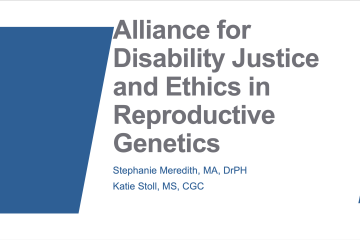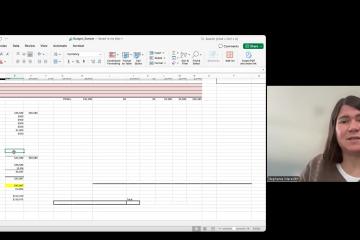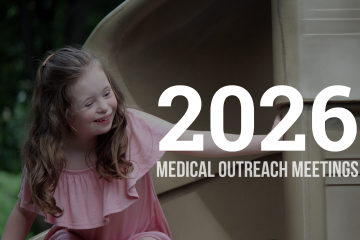During this month’s Medical Outreach Meeting, Dr. Stephanie Meredith presented on how to reach out to medical providers who are caring for patients with Down syndrome across the lifespan.
Transition Handbook
Dr. Meredith discussed updates to the Down Syndrome Transition Handbook, which she recently helped Jo Ann Simons (CEO of Northeast Arc) revise. This book covers a wide range of topics to prepare and support families and providers through different aspects of transitioning to adult care, such as medical transitions, high school and IEP goals, post-secondary programs, legal matters, funding resources, new family roles, making a plan for continuity of care, and more. Highlights include:
- Legal matters: Guardianship may or may not be the right choice to maintain involvement in medical decision-making. In the updated handbook, different models of tiered, supportive decision-making are shared. In addition, the handbook covers the anti-discrimination laws that ensure people with disabilities can have a support person with them in medical appointments as an accommodation, not as a guest.
- Medical care: Topics covered include transitioning from pediatric to adult providers, adult medical care guidelines, new developments in sleep apnea treatment, dental care and Medicaid considerations, emotional well-being, health and nutrition, and relationships and sexuality.
- Technology: With significant developments in AI and social media and numerous available apps for health management since this handbook was initially published in 2010, updates to the handbook now include supporting safe use of technology and social media and health management with technology.
Who could benefit from this handbook?
- Pediatricians: Pediatricians may find it useful to have this handbook to share with their families. Ideally, families start planning for the transition to adult care at age 14-16, and providing this handbook to families at visits in the teenage years can help ease this transition.
- Adult providers: The chapter on navigating the medical transition from pediatric to adult care is particularly valuable for adult medical providers, regardless of how familiar or unfamiliar they may be with Down syndrome.
- Families: The transition from pediatric to adult care can feel scary, particularly after forming close relationships with pediatricians and having to navigate the differences between pediatric and adult hospitals. Sharing this handbook with families of teenagers and adults with Down syndrome can help them better prepare and understand what the next steps might look like.
You can access this book for free at www.downsyndrometransition.com!
Notice anything that could be updated? Let Dr. Meredith know! This is an online, living resource that we will continue to update with advances in our knowledge.
Outreach to Adult Providers
Sharing resources is a great way of establishing a point of contact with new medical providers, and shows providers the value of your services. Examples of resources to share with medical providers caring for adults with Down syndrome include:
- The Down Syndrome Transition Handbook: Charting Your Child’s Course To Adulthood (Second Edition) by Jo Ann Simons and Stephanie Meredith (see above)
- Alzheimer’s Disease & Down Syndrome: A Practical Guidebook for Caregivers by the National Down Syndrome Society (NDSS)
- Other NDSS Down syndrome resources
- Medical Care for Adults With Down Syndrome: Guidelines From the Global Down Syndrome Foundation
- Health Care for Adults with Intellectual and Developmental Disabilities: Toolkit for Primary Care Providers
- Down Syndrome Medical Interest Group (DSMIG) – doctors, nurses, therapists, and other healthcare providers can join to get expert answers to their questions on Down syndrome care
Helping Families Find Adult Care
After spending years being cared for by trusted pediatric providers, transitioning to adult care can feel overwhelming for people with Down syndrome and their families. We encourage families to attend the first appointment with criteria in mind to see if the provider is a good fit. Providers do not need to be an expert in Down syndrome, but they do need to be motivated to learn and follow Down syndrome guidelines and to treat patients with Down syndrome like the adults that they are.
In addition, the following may be helpful to support families through this transition:
- The Down Syndrome Clinic to You (DSC2U) allows families to create a customized Down syndrome care plan to bring to caregivers and primary care physicians no matter where they are
- The Global Down Syndrome Foundation provides a directory of Down Syndrome Medical Care Centers in the US
- The Adult Down Syndrome Center, led by Dr. Brian Chicoine, has extensive resources for caregivers and health professionals
- The Down Syndrome Podcast Series, hosted by Dr. Kishore Vellody, is a great way for caregivers and providers to easily stay up-to-date on Down syndrome care
- Vanderbilt’s Health Care for Adults with Intellectual and Developmental Disabilities Toolkit for Primary Care Providers includes tools for patients, families, and support persons
- Dr. Brian Skotko regularly posts about advancements in Down syndrome care on Instagram and Facebook
- Ask other families in your local Down syndrome community which providers their adult child sees
- Invite providers to Down syndrome trainings – showing up to a training is a great indicator that a provider would be a good fit for working with Down syndrome patients


